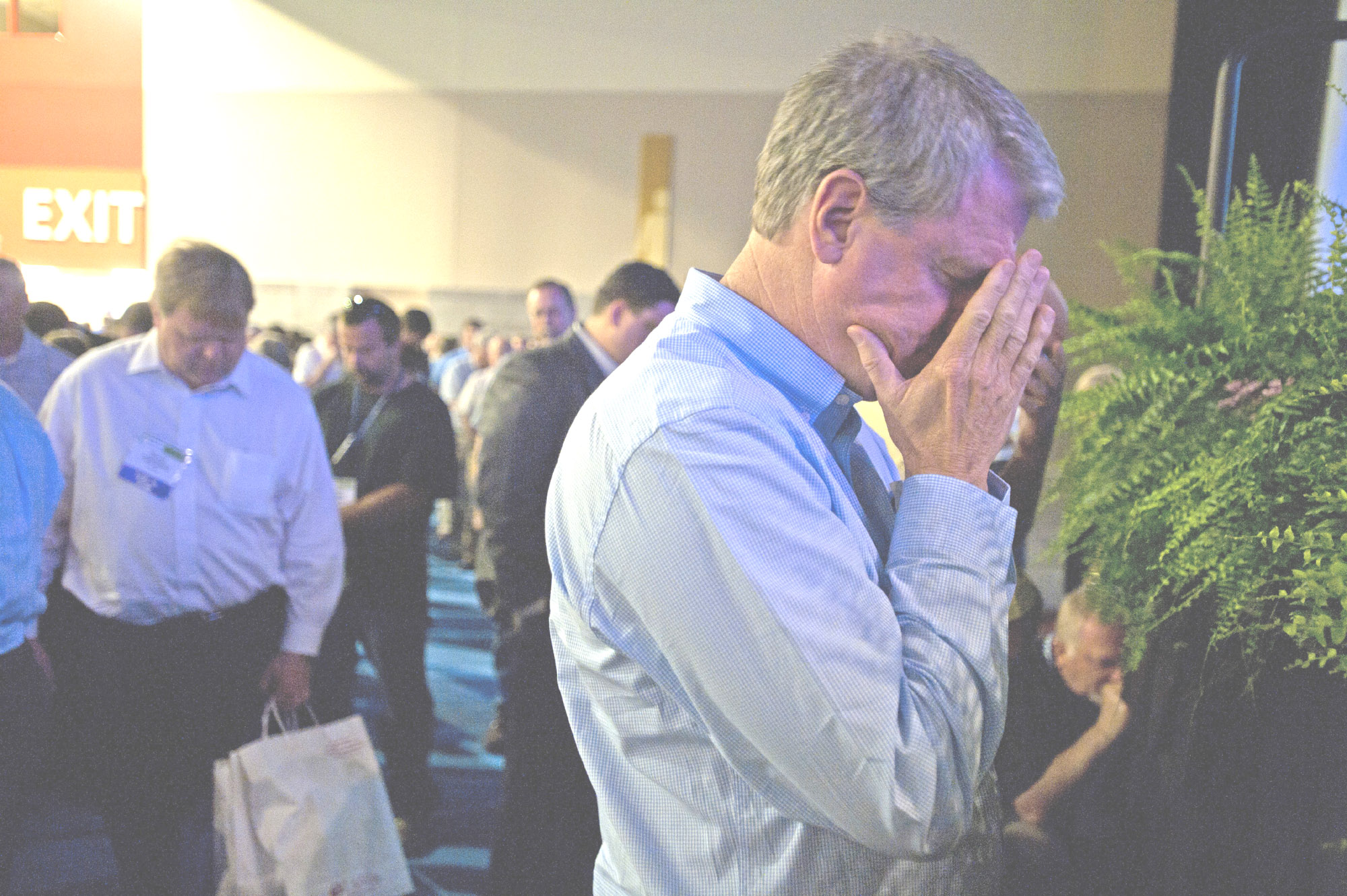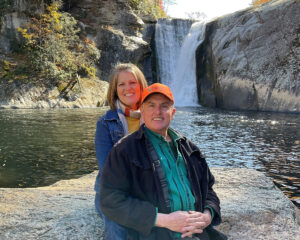
RICHMOND, Va. (BP)–“Let’s get to it already. We’re ready to roll.”
Micah Fries’ sentiment echoed throughout the crowd as IMB President Tom Elliff gave an invitation during the Southern Baptist Convention’s annual meeting June 14-15 in Phoenix. Elliff told messengers he felt like he was “holding back a dam” of Southern Baptists ready to walk forward and “embrace” the remaining 3,800 unengaged, unreached people groups around the globe.
Fries, pastor of Frederick Boulevard Baptist Church in St. Joseph, Mo., and his wife Tracy didn’t blink when the moment finally arrived for them to step forward and respond to a calling they felt deep inside.
Before Elliff invited people to come forward to turn in their commitment cards, he requested that no music be played.
And then he told them to “just get up and come.”
Fries and a multitude of pastors, church leaders and laypeople rose to their feet — almost in unison — and headed for the front of the convention floor to answer Elliff’s challenge. One performer onstage said she had goose bumps at the sight of men and women being obedient to God’s leading.
“It was … amazing,” said Laura Allen of the singing group No Other Name and a member of Inglewood Baptist Church in Nashville, Tenn. “People are serious about this. It was exciting for me as a Southern Baptist to see that … it could be a spark for something really great.”
The crowd was committing to learn more about how they could engage those people groups with no active church-planting strategy among them and less than a 2 percent evangelical presence.
Since the annual meeting, IMB staff is continuing to follow up with those who turned in 600-plus commitment cards. Elliff refers to the response as a time “when Southern Baptists were on the same page” in a call to action that might cost them their lives.
After serving with IMB in West Africa nine years ago, Fries contends more and more Southern Baptists — young and old — are more than ready for that type of sacrifice.
“We’ve got a huge number of people who are just eating that up and would love to engage in that kind of mission,” said Fries, whose church recently began efforts to work among a Central Asian people group.
“The convention is looking for a reason for all of us to engage together,” he said. “I thought it was a big moment.”
The spirit of unity and one purpose among Southern Baptists that final night of the convention — and during the entire SBC meeting and Pastors’ Conference — was something Eric Thomas, pastor of First Baptist Church in Norfolk, Va., said he hasn’t seen in a long time. Being at the meeting this year, Thomas said, “struck a deep cord” within him.
“The simplicity of the call was strong and powerful,” said Thomas, who was elected as the SBC’s second vice president.
“Regardless of where you come down on different issues in Southern Baptist life, to reach an unreached people group is — at its core — the biblical mandate that we embrace as Southern Baptists and have embraced from our initiation as Southern Baptists.”
Al Jackson, pastor of Lakeview Baptist Church in Auburn, Ala., said he wasn’t surprised when he saw the number of people rise up from their seats to respond to the challenge that night.
“There is so much more for us to do,” Jackson said. “It’s going to take sacrifice of our time, sacrifice of our people.”
While Lakeview Baptist continues to work among Arab Swahili people along Africa’s east coast, Jackson said he wants the church to keep learning and finding ways to help reach the unengaged, unreached.
“For pastors, we’re inundated with the immediate,” he said. “It’s easy to let the unseen be neglected, [but] God is a God of nations.
“I came away deeply moved in my spirit,” he said. “In many ways this would be the single most encouraging convention that I’ve attended.”
WHAT IS EMBRACE?
The embrace challenge is different from “adopting” a people group. It is a more focused emphasis that challenges churches to make a lifetime commitment to an unengaged, unreached people group.
To engage them will take tremendous sacrifice, Elliff said.
“They’re unengaged for a reason,” he recently told IMB staff. “A lot of them are on top of mountains, deep in the valley and in countries that are absolutely closed. We can’t do it alone. IMB can’t do it. Southern Baptists can’t do it alone.”
This initial response from pastors is just the beginning — a “crack in the barrel” — of a long and challenging journey,” Elliff said. He hopes it will spur more Southern Baptists to accept and follow through with this opportunity so that every language, people, tribe and nation will have an opportunity to hear and accept the Gospel of Jesus Christ.
FIRST STEPS
To begin the “embrace” process, pastors and church leaders are urged to check out the embrace website at call2embrace.org. Here, they can begin the journey, which IMB leadership suggests should begin with church-wide focused prayer. Churches can download a six-week Sunday worship prayer guide and small-group guides that are provided on the embrace site.
Pastors also are encouraged to:
— explore the approximately 3,800 unengaged, unreached people groups by visiting gettingthere.imbresources.org. On this site, churches can study a group’s location, culture and identify their language, religion, barriers to the Gospel and other helpful information.
— register to attend one of the embrace equipping conferences scheduled:
Sept. 7 at Johnson Ferry Baptist Church in Marietta, Ga.
Oct. 27 at Hillcrest Baptist Church in Cedar Hill, Texas
Nov. 4 at Applewood Baptist Church in Denver
March 24 at Immanuel Baptist Church in Highland, Calif.
Additional training opportunities are being planned.
The embrace site also includes links to information on the global status of evangelism, church-planting movements, discipleship training and spiritual warfare.
For more information on how churches can become involved, contact the IMB at 1-800-999-3113 or go to imb.org.
–30–
Alan James is a senior writer for the International Mission Board.















